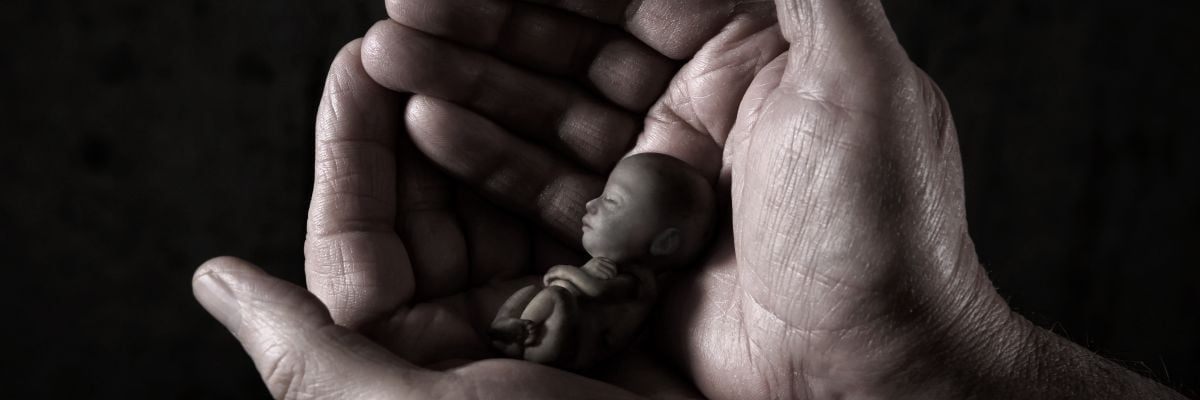
This week the U.S. Catholic bishops debated whether a letter accompanying their document on political life, “Forming Consciences for Faithful Citizens,” should describe abortion as the “preeminent” moral issue facing Americans today. Those who opposed describing abortion in this way said it contradicted the teachings of Pope Francis.
In particular, they cited his apostolic exhortation Gaudete Et Exsultate, which affirms the need to defend the unborn but goes on to say, “Equally sacred, however, are the lives of the poor, those already born, the destitute, the abandoned and the underprivileged, the vulnerable infirm and elderly exposed to covert euthanasia, the victims of human trafficking, new forms of slavery, and every form of rejection” (101).
There’s a lot of truth in this. All human lives are equally sacred. But not all threats to human life are equally severe, which means some require more resources in combating them than do others.
In 1860, slaves in America suffered not only from the dehumanizing institution of slavery itself but also from unjust laws that kept them from marrying, voting, receiving an education, and enjoying many other basic rights we take for granted today. But none of these evils could be addressed until the foundational injustice of the Supreme Court’s Dred Scott v. Sanford case (which denied citizenship to black Americans) was overturned by the thirteenth and fourteenth amendments of the Constitution.
Slavery wasn’t the only evil facing our country, or even blacks, in 1860, but it was a foundational evil that had to be erased in order to create a new foundation for true social justice to emerge across a wide variety of other issues. The same is true of abortion today.
The Compendium of the Social Doctrine of the Church says, “Promoting human dignity implies above all [emphasis added] affirming the inviolability of the right to life, from conception to natural death, the first among all rights and the condition for all other rights of the person” (553). In fact, one of the ways we protect the rights of the poor, the immigrant, and the terminally ill is by defending basic principles of justice that benefit all people, be they born or unborn.
How can we pass laws to stop assisted suicide if it’s already legal for people to exercise “bodily autonomy” through abortion? Why should the disabled be protected from “covert euthanasia” if children in the womb can be killed because they can’t “think like us” or “survive on their own”? If the unborn can be victimized because they haven’t become citizens through birth, then what keeps this logic from being applied to immigrants who also haven’t become citizens yet?
In a speech he gave to an Italian pro-life group in February, Pope Francis put it this way:
Those who have been conceived are children of the whole of society. Their killing in huge numbers, with the endorsement of states, is a serious problem that undermines the foundations of the construction of justice, compromising the proper solution of any other human and social issue.
In other words, if you get the right to life wrong, you have little hope of getting anything else right. That’s why the USCCB says on its website, “The right to life is the first and most fundamental principle of human rights that leads Catholics to actively work for a world of greater respect for human life and greater commitment to justice and peace.”
We can also determine the moral gravity of a social issue by looking at the nature of the evil involved and the number of people it affects. The issues that are most preeminent, or that require our greatest attention and resources, are those that involve the gravest evils and the greatest number of people.
Most people would agree that the taking of innocent human life is the gravest evil that one human being can inflict upon another human being. It’s why the harshest punishments in our legal system are usually reserved for murderers.
In 1860, slavery was America’s preeminent social issue. Abortions did happen, but they were the work of outlaws whom the American Medical Association called “modern-day Herods.” Slavery, on the other hand, was legal in much of the country, with about four million slaves making up 13 percent of the nation’s population. To say at the time that slavery was the most important social issue did not detract from the importance of other issues (like child labor and urban squalor). Instead, it highlighted the foremost evil that had to be overcome for the good of our entire nation.
Today, slavery is illegal (though it is estimated that about 15,000 people are brought into the U.S. each year for human trafficking, which Pope Francis calls a “new form of slavery”). But approximately 850,000 children will be killed through legal abortion in this year alone. To put that into perspective: the number-one cause of death in the U.S. is heart disease, which kills about 650,000 people every year. Accidents, suicides, and homicides combined kill about 230,000 people every year. Twenty death-row inmates have been executed so far this year.
Saying that abortion is just one issue among others that should be given equal consideration, such as the death penalty, is like saying that 40,000 gun deaths in this country is just “one issue” and other issues, such as the twenty people killed every year by cows, should be given equal consideration alongside it.
This doesn’t mean we should ignore the lives of victimized already-born people, but neither should all important social issues, or even all “human life issues,” be treated equally in our political and pastoral responses. Even Cardinal Joseph Bernadin, whose “seamless garment” has been cited to make a “pro-life” issue out of every cause imaginable, recognized that
I know that some people on the left, if I may use that label, have used the consistent ethic to give the impression that the abortion issue is not all that important anymore, that you should be against abortion in a general way but that there are more important issues, so don’t hold anybody’s feet to the fire just on abortion. That’s a misuse of the consistent ethic, and I deplore it. But the misuse does not invalidate the argument.
Recognizing abortion’s preeminence as a social issue doesn’t mean we ignore every other offense against human life. (Whereas, in practice, making abortion just “one issue among many” is a sure-fire way to make cause the unborn to be under-served or even ignored in favor of other, less-controversial issues.) Instead, it just means that as the Church guides its members to promote justice in the world, we should put first those most helpless people who experience the worst injustices on the largest scale.



